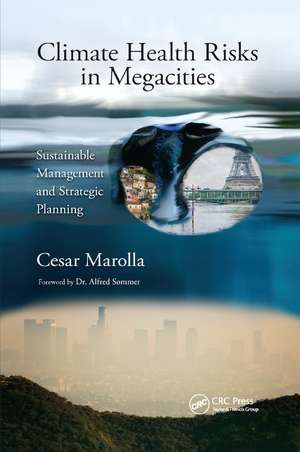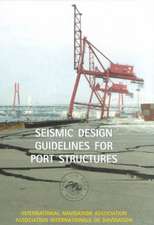Climate Health Risks in Megacities: Sustainable Management and Strategic Planning
Autor Cesar Marollaen Limba Engleză Paperback – 10 dec 2019
| Toate formatele și edițiile | Preț | Express |
|---|---|---|
| Paperback (1) | 489.26 lei 6-8 săpt. | |
| CRC Press – 10 dec 2019 | 489.26 lei 6-8 săpt. | |
| Hardback (1) | 1046.65 lei 6-8 săpt. | |
| CRC Press – 6 dec 2016 | 1046.65 lei 6-8 săpt. |
Preț: 489.26 lei
Preț vechi: 575.60 lei
-15% Nou
Puncte Express: 734
Preț estimativ în valută:
93.62€ • 98.01$ • 77.46£
93.62€ • 98.01$ • 77.46£
Carte tipărită la comandă
Livrare economică 05-19 aprilie
Preluare comenzi: 021 569.72.76
Specificații
ISBN-13: 9780367878153
ISBN-10: 0367878151
Pagini: 369
Dimensiuni: 156 x 234 x 20 mm
Greutate: 0.45 kg
Ediția:1
Editura: CRC Press
Colecția CRC Press
ISBN-10: 0367878151
Pagini: 369
Dimensiuni: 156 x 234 x 20 mm
Greutate: 0.45 kg
Ediția:1
Editura: CRC Press
Colecția CRC Press
Cuprins
Foreword
Preface
Part 1: Managing Climate Change and Health Risks in Megacities
Chapter 1 Megacities and Public Health
Chapter 2 The IPCC Fifth Assessment Report and its Implications for Human Health and Urban Areas
Chapter 3 The Urban Poor and the Response of Megacities to Dealing with Climate Change Health Risks
Chapter 4 Managing Climate Change and Health Risk in Megacities
Chapter 5 GHG Emissions and Climate Change Risks
Part 2: Risk Management and Its Relation to Climate Change
Chapter 6 Management Strategy for Effecting Change within Megacities
Chapter 7 Turning Theory into Reality: The Benefits of a Risk Management Approach
Chapter 8 Building Resilience and Sustainable Development in the Face of Disasters and Climate Change
Chapter 9 Resilient Communities through Environmental Planning and Design – Accounting for Future Scenarios and Regenerative Capacity
Chapter 10 The Epoch of Smart Cities and Innovation
Part 3: Global Health Risks, Facts and Challenges of Climate Change Implication
Chapter 11 Global Health Risks, the Urban Poor and Climate Change Impacts
Chapter 12 Climate Change Impacts on Health: Urban Poor and Air Pollution in European Context
Chapter 13 National Security and Public Health Implications of Climate Change
Part 4: Case Study: Researched Megacities
Chapter 14 Overview of Megacities Used in Case Study
Chapter 15 The City of New York
Chapter 16 Rio de Janeiro
Chapter 17 Beijing
Chapter 18 Los Angeles
Chapter 19 London
Chapter 20 Mumbai
Chapter 21 Lagos
Part 5: Prognosis for Change
Chapter 22 Risk Management, Strategy and Leadership
Appendix Climate Action in Megacities
Preface
Part 1: Managing Climate Change and Health Risks in Megacities
Chapter 1 Megacities and Public Health
Chapter 2 The IPCC Fifth Assessment Report and its Implications for Human Health and Urban Areas
Chapter 3 The Urban Poor and the Response of Megacities to Dealing with Climate Change Health Risks
Chapter 4 Managing Climate Change and Health Risk in Megacities
Chapter 5 GHG Emissions and Climate Change Risks
Part 2: Risk Management and Its Relation to Climate Change
Chapter 6 Management Strategy for Effecting Change within Megacities
Chapter 7 Turning Theory into Reality: The Benefits of a Risk Management Approach
Chapter 8 Building Resilience and Sustainable Development in the Face of Disasters and Climate Change
Chapter 9 Resilient Communities through Environmental Planning and Design – Accounting for Future Scenarios and Regenerative Capacity
Chapter 10 The Epoch of Smart Cities and Innovation
Part 3: Global Health Risks, Facts and Challenges of Climate Change Implication
Chapter 11 Global Health Risks, the Urban Poor and Climate Change Impacts
Chapter 12 Climate Change Impacts on Health: Urban Poor and Air Pollution in European Context
Chapter 13 National Security and Public Health Implications of Climate Change
Part 4: Case Study: Researched Megacities
Chapter 14 Overview of Megacities Used in Case Study
Chapter 15 The City of New York
Chapter 16 Rio de Janeiro
Chapter 17 Beijing
Chapter 18 Los Angeles
Chapter 19 London
Chapter 20 Mumbai
Chapter 21 Lagos
Part 5: Prognosis for Change
Chapter 22 Risk Management, Strategy and Leadership
Appendix Climate Action in Megacities
Notă biografică
Cesar Marolla is a Senior Sustainability Leader and consultant with vast experience working for global corporations and NGO’s. He has worked in sustainability, climate change, risk management, business marketing strategies in sustainability and corporate responsibility in Europe, South America, Middle East, and Northeast Africa and in the US. Mr. Marolla has assembled sustainability assessments and best practice for Fortune 500 corporations and participated in climate talks with the United Nations Conference of Parties (COP) and international NGO’s such as the Global eSustainability Initiative dedicated to communicating how the Information and Communication Technology (ICT) industries can address and provide solutions for environmental issues. He has interviewed, researched and collaborated with world-renown leaders from the World Health Organization (WHO), World Bank, Deutsche Telekom, United States Centers for Disease Control and Prevention (CDC), United Nations, U.S. Department of Defense, Columbia University and Harvard University.
Mr. Marolla is the recipient of the 2013 Harvard University Derek Bok Civic Prize Award that recognizes creative initiatives in community service and long-standing records of civic achievement. He also received a Certificate of Appreciation from the Department of Defense for his volunteerism supporting the US troops in the Middle East and Northeast Africa under the umbrella of the "Global War on Terror" (GWOT). Moreover, he received a ‘Military Coin’, which is given as a token of affiliation, support, patronage, respect, honor and gratitude, and presented by the Camp Victory Commander in Kuwait, Lieutenant Colonel Lawrence J. Smith. He has received a Bachelor of Science in Business Administration and Marketing from Columbia College and a Master of Liberal Arts Degree in Sustainability and Environmental Management from Harvard University. Cesar has also completed the Executive Education for Sustain
Mr. Marolla is the recipient of the 2013 Harvard University Derek Bok Civic Prize Award that recognizes creative initiatives in community service and long-standing records of civic achievement. He also received a Certificate of Appreciation from the Department of Defense for his volunteerism supporting the US troops in the Middle East and Northeast Africa under the umbrella of the "Global War on Terror" (GWOT). Moreover, he received a ‘Military Coin’, which is given as a token of affiliation, support, patronage, respect, honor and gratitude, and presented by the Camp Victory Commander in Kuwait, Lieutenant Colonel Lawrence J. Smith. He has received a Bachelor of Science in Business Administration and Marketing from Columbia College and a Master of Liberal Arts Degree in Sustainability and Environmental Management from Harvard University. Cesar has also completed the Executive Education for Sustain
Recenzii
"The literature is replete with information on the wide range of threats and opportunities facing the world’s largest cities. Cesar Marolla took the next step to examine how these findings affect the public health of the people residing in or visiting these cities. Mr. Marolla also determined how sustainability can be used to address the health of a large portion of the world’s population. If you are interested in the ‘people part’ of the triple bottom line, this book is a must read for you."
—Robert B. Pojasek, Harvard University, Cambridge, Massachusetts, USA
"A body of research shows that forms of governance, social and environmental aspects, can influence a population's health. In developing countries, the rise of megacities occurred without of a suitable plan. Many of them have a high population density, a complex and insufficient system of infrastructure and environmental quality. Climate change can aggravate the health of population living in those megacities. Cesar Marolla presents in this book steps to help better manage and solve issues for those cities. Managers, researchers, and citizens that are interested in urban health will find interesting and scientific valuable information in this book."
—Martha M.L. Barata, Oswaldo Cruz Foundation, Rio de Janeiro, Brazil
"Military planners model future threats to the nation and our economic partners to predict areas of potential military conflict. The Department of Defense has seriously evaluated the impacts that climate change will have on the stability of world governments and the ensuing armed conflicts over territory and resources. One of the underlying causes of today’s political unrest and violence is the change in available natural resources caused by climate change. There are no single climate change impacts to plan for. The interrelationship of increased temperature, rainfall, sea level, and large storms will result in regional declines to success in farming, hunting and fishing. Food scarcity and increased exposure to diseases will fuel the migration of rural populations to the cities. In this long overdue book, Cesar Marolla has evaluated the climate change factors, described the human and ecological impacts and proposed reasonable methods to achieve a level of sustainability. If you want to make a difference in the future of planet Earth, read this book."
—Robert W. Wood, United States Edwards Air Force Base, California, USA
"A variety of factors are associated with the risk of infectious and chronic disease, across different domains including lifestyle, social, and environmental factors. By exacerbating existing environmental risks within megacities, climate change presents a unique challenge to deal with the growing public health issues inherent in large, dense populations. Cesar Marolla presents an articulate and comprehensive guide on climate health and how it affects the health of individuals living in megacities, along with practical solutions for megacities around the world. Mr. Marolla reminds us of the pressing need to look beyond ideological boundaries in order to collectively create effective solutions to both mitigate future extreme climate conditions and develop the needed policies and infrastructure when such events inevitably befall us."
—Alain K. Koyama, Health Advocate, Westlake Village, California, USA
"Every city has unique challenges and opportunities in adapting to the perils of climate change. Climate change makes weather extremes worse than they would otherwise be naturally. The increasing frequency, intensity and duration of heatwaves in particular will impact the health of the urban poor. This book is a tour de force on how megacities are testbeds of progress in adapting critical human systems to a warming world."
—Adam Smith, National Oceanic and Atmospheric Administration/National Centers for Environmental Information, Asheville, North Carolina, USA
"Cesar Marolla’s book Climate Health Risks in Megacities: Sustainable Management and Strategic Planning is a timely and important work that provides a path forward to strengthen and protect our populations in the urban environment. As climate impacts manifest in a world of increasing affluence, urbanization, and inter- and intra-state migration, preparing for and mitigating risks to our cities, and mega-cities becomes ever more critical. With more than half of the world population in urban areas today, Dr. Marolla’s book provides an important and comprehensive look at the impacts of climate change on health and security as well as a framework and approach for risk management and mitigation."
—Cheryl Rosenblum, CNA, Arlington, Virginia, USA
—Robert B. Pojasek, Harvard University, Cambridge, Massachusetts, USA
"A body of research shows that forms of governance, social and environmental aspects, can influence a population's health. In developing countries, the rise of megacities occurred without of a suitable plan. Many of them have a high population density, a complex and insufficient system of infrastructure and environmental quality. Climate change can aggravate the health of population living in those megacities. Cesar Marolla presents in this book steps to help better manage and solve issues for those cities. Managers, researchers, and citizens that are interested in urban health will find interesting and scientific valuable information in this book."
—Martha M.L. Barata, Oswaldo Cruz Foundation, Rio de Janeiro, Brazil
"Military planners model future threats to the nation and our economic partners to predict areas of potential military conflict. The Department of Defense has seriously evaluated the impacts that climate change will have on the stability of world governments and the ensuing armed conflicts over territory and resources. One of the underlying causes of today’s political unrest and violence is the change in available natural resources caused by climate change. There are no single climate change impacts to plan for. The interrelationship of increased temperature, rainfall, sea level, and large storms will result in regional declines to success in farming, hunting and fishing. Food scarcity and increased exposure to diseases will fuel the migration of rural populations to the cities. In this long overdue book, Cesar Marolla has evaluated the climate change factors, described the human and ecological impacts and proposed reasonable methods to achieve a level of sustainability. If you want to make a difference in the future of planet Earth, read this book."
—Robert W. Wood, United States Edwards Air Force Base, California, USA
"A variety of factors are associated with the risk of infectious and chronic disease, across different domains including lifestyle, social, and environmental factors. By exacerbating existing environmental risks within megacities, climate change presents a unique challenge to deal with the growing public health issues inherent in large, dense populations. Cesar Marolla presents an articulate and comprehensive guide on climate health and how it affects the health of individuals living in megacities, along with practical solutions for megacities around the world. Mr. Marolla reminds us of the pressing need to look beyond ideological boundaries in order to collectively create effective solutions to both mitigate future extreme climate conditions and develop the needed policies and infrastructure when such events inevitably befall us."
—Alain K. Koyama, Health Advocate, Westlake Village, California, USA
"Every city has unique challenges and opportunities in adapting to the perils of climate change. Climate change makes weather extremes worse than they would otherwise be naturally. The increasing frequency, intensity and duration of heatwaves in particular will impact the health of the urban poor. This book is a tour de force on how megacities are testbeds of progress in adapting critical human systems to a warming world."
—Adam Smith, National Oceanic and Atmospheric Administration/National Centers for Environmental Information, Asheville, North Carolina, USA
"Cesar Marolla’s book Climate Health Risks in Megacities: Sustainable Management and Strategic Planning is a timely and important work that provides a path forward to strengthen and protect our populations in the urban environment. As climate impacts manifest in a world of increasing affluence, urbanization, and inter- and intra-state migration, preparing for and mitigating risks to our cities, and mega-cities becomes ever more critical. With more than half of the world population in urban areas today, Dr. Marolla’s book provides an important and comprehensive look at the impacts of climate change on health and security as well as a framework and approach for risk management and mitigation."
—Cheryl Rosenblum, CNA, Arlington, Virginia, USA
Descriere
Climate Health Risks in Megacities: Sustainable Management and Strategic Planning courageously confronts the immense challenges of alleviating climate change and takes the initiative to layout an agenda that calls for action in the rapidly changing landscape of our global climate. This guide provides a constructive methodology for developing and























